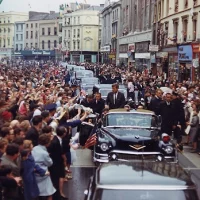Victor Masbayi was born in Nairobi, Kenya in 1951; he lived there with his family throughout his undergraduate college education at the University of Nairobi. While working for the African Medical and Research Foundation, Masbayi was sponsored to complete a Master’s Degree in Public Health at the University of Michigan at Ann Arbor. After receiving… Read More "Reflections on a Career: Health and Population in East Africa"
Protecting Greenland: The American Consulate at Godthab, 1940-42
During World War II, Nazi Germany invaded and occupied continental Denmark, leaving the Kingdom’s other two territories, the Faroe Islands and Greenland, exposed to a possible German invasion. The United Kingdom quickly occupied the Faroe Islands and, along with Canada, made plans to occupy parts of Greenland, which would drag the otherwise neutral island into… Read More "Protecting Greenland: The American Consulate at Godthab, 1940-42"
Guns, Oil and Education: Qatar’s Evolving Relationship with the U.S.
The State of Qatar declared independence from Great Britain on September 3, 1971 and the U.S. recognized it two days later, establishing diplomatic relations in March 1972. The American Embassy in Doha was launched the following year, and the first resident U.S. Ambassador to Qatar presented his credentials in August 1974. The relationship has developed… Read More "Guns, Oil and Education: Qatar’s Evolving Relationship with the U.S."
The Lion King of Swaziland
King Sobhuza II was proclaimed King of Swaziland at the age of four months and would rule for 83 years, becoming the world’s longest-reigning monarch. His grandmother, with help from his uncle, acted as regent of Swaziland until his coronation in December 1921, when his name was changed to Ngwenyama, which means “The Lion.” Sobhuza’s… Read More "The Lion King of Swaziland"
Relations between the U.S. and Ireland have traditionally been strong, thanks to common ancestral ties, history and shared values. Irish citizens immigrated to the thirteen Colonies, fought in the War of Independence and were among the first to drive cattle westward. Prompted largely by the Great Irish Famine, from 1820 to 1860 two million Irish… Read More "Ireland and the U.S.: The Best of Friends, Except When They Weren’t"
Grapes of Wrath and Strained Relations with Chile
Grocery stores throughout the United States pulled tons of grapes from their shelves when traces of cyanide were found in two grapes shipped from Chile to Philadelphia on March 13, 1989. The Commissioner of the Food and Drug Administration advised Americans to get rid of all fruit in their homes unless they were certain it was… Read More "Grapes of Wrath and Strained Relations with Chile"
The Thai-tanic: Responding to the Asian Financial Crisis of 1997
Asian countries took a financial hit in 1997, resulting in a crisis that reverberated throughout the world. It began on July 2, when the central Bank of Thailand allowed the baht to float against the U.S. dollar for the first time in 14 years. The baht plunged between 15-20 percent in overseas currencies. The collapse of… Read More "The Thai-tanic: Responding to the Asian Financial Crisis of 1997"
Kimberley Process: Commercial Diplomacy to Stem the Flow of Blood Diamonds
During the 1990s, several African countries, namely Angola, Cote d’Ivoire, the Democratic Republic of the Congo, Sierra Leone, and Liberia were plunged into chaos and embroiled in devastating civil wars. Thanks to economic and political insecurity and contentious inter-ethnic relations, rebel groups such as the Patriotic National Front of Liberia under the leadership of Guy… Read More "Kimberley Process: Commercial Diplomacy to Stem the Flow of Blood Diamonds"
Beginning of a Beautiful Friendship: The 1951 Treaty of Peace with Japan
The San Francisco Peace Treaty, signed by 48 nations on September 8, 1951, officially ended Japan’s position as an imperial power, provided compensation to those who had suffered in Japan during the Second World War, and terminated the Allied post-war occupation of Japan. The treaty’s seven chapters and preamble marked the end of hostilities between the signatories… Read More "Beginning of a Beautiful Friendship: The 1951 Treaty of Peace with Japan"
Algeria’s Struggle for Independence
The modern-day People’s Democratic Republic of Algeria is now a proud, sovereign state in North Africa that readily influences the region. However, before 1962, Algeria had been a French colony, dating back to the French invasion of Algiers in 1830. Following a brutal conquest that some termed as genocide, France began a policy of “civilizing”… Read More "Algeria’s Struggle for Independence"

